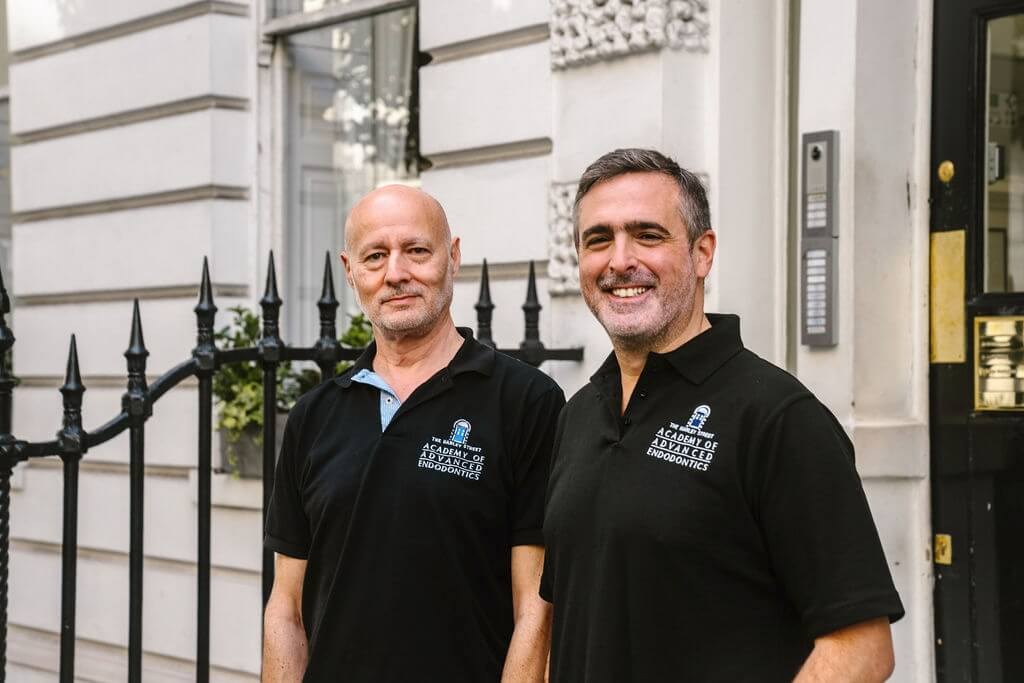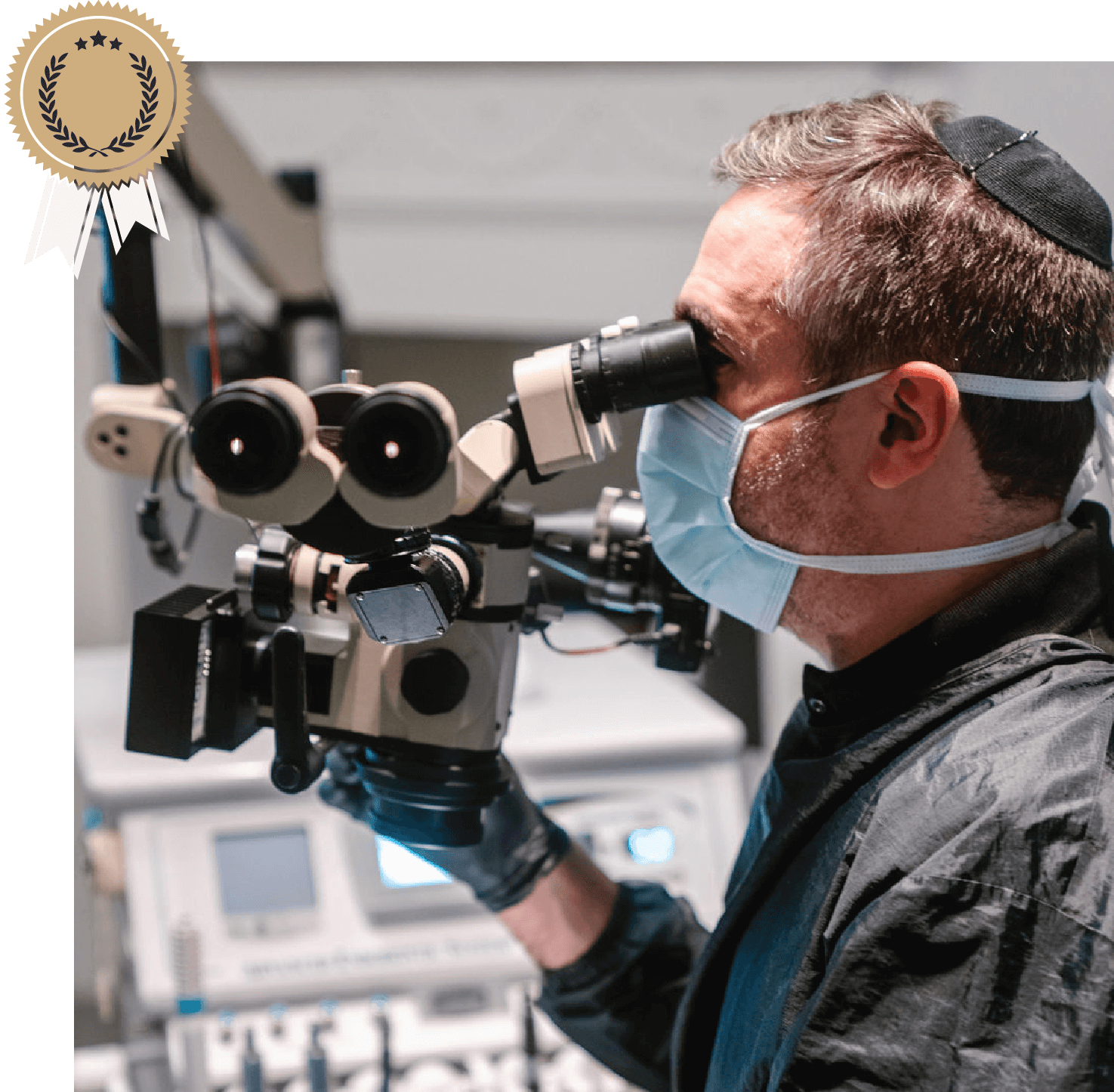Advanced Root Canal Treatments on Harley Street
SAVING TEETH OTHERS MIGHT EXTRACT
5 Stars
From 100+ Google Reviews

Founded by a UCL Eastman Department Head
Richard Kahan and David Selouk, two of the most respected names in the field, lead the Academy of Advanced Endodontics.
With over 40 years of experience, Richard has pioneered the integration of cutting-edge technology with exceptional patient care. His vision, shaped by his leadership at the Eastman Dental Institute, led to the creation of the Academy, a hub of innovation and expertise.
David, a specialist and co-director, with over 20 years of experience shares this commitment to excellence. A distinguished alumnus of the Eastman Dental Institute, his passion for saving natural teeth and mastery of advanced techniques cement his reputation as a leader in endodontics.
Together, they bring unrivalled expertise and innovation to ensure every patient receives world-class care.

Fotona Lightwalker
Laser Disinfection
Next generation canal disinfection for optimal treatment outcomes.

Exceptional Clinicians
Founded by a UCL Department Head and backed by a team of educators and innovators.

45-60 min Consultations
All initial consults are 45min to 60min and include 3D imaging and a cost-assured treatment plan.
Advanced Laser Disinfection and 3D Imaging
We use cutting-edge tools to provide the most precise and effective treatment:
- CBCT imaging for in-depth diagnosis (not just standard X-rays).
- Laser disinfection, offering exceptional root canal cleaning that few clinics in the UK use.
- 3D volumetric healing assessment, ensuring successful treatment before crowns are placed.
Learn more about CBCT
ULTRA LOW-DOSE 3D SCANS
Unlike standard X-rays, we use an ultra-low dose 3D (CBCT) scan combined with advanced software to diagnose lesions and track healing precisely. This level of accuracy ensures the best possible treatment decisions—something few, if any, clinics offer at this level.

ALL-INCLUSIVE FEES, NO SURPRISES
All Inclusive Fees, No Surprises
We take the time to provide a thorough
diagnosis and treatment plan, with initial consults lasting 45-60 minutes and including an advanced CBCT (3D Imaging) scan. CBCT’s are not optional, as they are vital for correct diagnosis.
This initial consult costs £395, including a CBCT scan and report.
Post-consult, you will receive a detailed report, treatment plan and quotation.
There are no hidden costs or unexpected fees, so you can confidently proceed with treatment.
If any repeat treatment is required within 12 months, barring surgery, this will be free of charge.
| Consultation & CBCT Scan & Report | |||
|---|---|---|---|
| 45-60min Consultation Including a CBCT Scan and Report | £395 | ||
| Additional CBCT Scan | £215 per quadrant | ||
| Total Minimum | £395 (single quadrant) | ||
| Endodontic Treatment | |||
| Depending on Clinician and Complexity | £860-2390 | ||
| Extra Procedures | |||
| Occasionally, additional non-routine procedures are required and will be quoted for at consult | TBC | ||
Your Root Canal Journey, Step by Step
1
45-60min Consult
We take the time to provide a thorough diagnosis and treatment plan, with initial consults lasting 45-60 minutes and including an advanced CBCT (3D Imaging) scan. You will be sent an all-inclusive quote and treatment plan post-consult.
2
Treatment
Your clinician will calmly explain the treatment before we begin. We leave plenty of time for the anaesthetic to take effect and then apply advanced techniques and treatment protocols to ensure a pain-free experience with exceptional outcomes.
3
Follow-Up
We will arrange a follow-up to ensure everything is healing correctly. If any re-treatment is required within 12-months, barring surgery, this will be conducted free of charge.
Our location
99 Harley Street
Strategically located at the heart of London’s renowned medical district, the Academy of Advanced Endodontics enjoys its position on prestigious Harley Street, ensuring easy accessibility and a prime setting for patients and practitioners alike.
Take the first step towards pain-free, expert root canal care. Let us help you save your natural teeth and restore your oral health.
FAQs
Answering our most commonly asked questions.
What is Root Canal or Endodontics?
Root canal treatment is a way to save a tooth that has been damaged by deep decay, breakage or infection. The purpose of treatment is to restore the tooth to good health so it can function properly inside your mouth. An endodontist is a specialist in root canal treatment.
Why should a tooth need to be root treated?
Deep inside every tooth is a pulp chamber and root canals that contain living tissue called the pulp. The pulp is often mistakenly referred to as the ‘nerve’, but in fact it contains a fine network of tissue fibres, nerves and blood vessels. If a large cavity in a tooth reaches the pulp chamber, or if a tooth breaks, bacteria can reach the pulp. These bacteria damage the pulp and eventually destroy it. The root canals become infected and inevitably an abscess forms beneath the root of the tooth, in the jaw bone. Pain (occasionally severe) may occur at any time during this process, although it does not always, and the infection can spread.
How is Root Canal Treatment done?
The purpose of the treatment is to remove the bacteria or dying nerves from inside the tooth and to disinfect the root canals. This is achieved by making a small hole through the tooth into the pulp chamber, locating and measuring the root canals, then cleaning and widening them using fine instruments called files. Once clean, the canals are filled to seal them off from reinfection. In most cases abscesses will start to heal at this point. Changes on the x-ray are not usually seen for up to six to eight months following treatment.
Is it painful?
No. Local anaesthesia is used throughout the procedure and every possible step is taken to ensure you are comfortable while the work is carried out. On very rare occasions, some teeth are particularly sensitive, but a number of techniques are available to enable even these teeth to be tackled. Following treatment you will be informed of the possibility of discomfort from the area. This is usually minor and does not last long. Occasionally (5% incidence) the tooth can flare up, giving rise to significant pain. Should this occur the acute symptoms are usually treated with antibiotics and anti-inflammatories (painkillers). A flare-up is an unfortunate and rare occurrence and is related to factors such as host response and bacterial virulence. It does not mean the tooth has a lower chance of successfully being treated.
Are a large number of X-Rays taken?
The only way to ascertain what is happening inside and underneath teeth is through the use of x-rays. X-ray pictures inside the mouth produce only very small doses of radiation and pose virtually no danger. However, to further reduce risk, the surgery has the latest computerised x-ray system and a high-frequency x-ray tube. This reduces the already small radiation dose by a further 75%-80% and means that for the same dose of one regular mouth x-ray, four computerised x-rays can be taken. For most endodontics, only two or three x-rays are required.
How long does treatment take?
This can vary according to the complexity of the root canals, the presence of infection, or if retreatment is being carried out. Sometimes treatment can be carried out in one session lasting between one and two-and-a-half hours. If the canals are infected or are being retreated it is usually necessary to place an antibacterial dressing in the tooth. This is sealed in for a few weeks before a further appointment.
Is success guaranteed?
Root canal treatment enjoys a high level of success. However, it is impossible to guarantee the success of any medical procedure. Even with the best treatment, healing may not occur due to circumstances beyond the control of the physician. For teeth without abscess formation (dying only), root canal treatment enjoys a high rate of success (90%-95% survival at 10-15 years). Once a tooth has become infected the success rate can diminish with the increasing size of the abscess. Success in these cases is 70%-85% survival at 10-15 years.
Should treatment fail, which can be established either through a return of the pain symptoms or an x-ray showing no healing, further steps might need to be taken to eradicate the infection. These include redoing the root treatment, surgical techniques or possibly the extraction of the tooth.
I have read that infection in root canals cannot be eradicated and that infected teeth should be extracted?
It is true that the complexity of the root canal system will allow bacteria to evade our efforts at disinfection, and that some bacteria will survive if they have penetrated deep into the tooth. It is also true that the effect of these types of bacteria and the body’s chronic inflammatory response to protect itself from them, can potentially cause systemic diseases in susceptible individuals.
As with any medical intervention, it is important to weigh up risks against benefits. There is no scientific evidence to link residual bacteria left in root-treated teeth with any systemic disease. For this to be feasible, it is likely that the patient would have to be disease-susceptible and this would be a great rarity. As a living organism, we co-exist with bacteria in our bodies. This risk will therefore be very small and impossible to quantify.
Without root canal treatment, the only way to completely eradicate the source of infection would be to extract the tooth. This could lead to cosmetic and functional disadvantages, possibly altering the quality of life. Replacement (false) teeth can be provided but all of these, whether fixed or removable, are invariably compromises that damage the adjacent teeth or gums, leading to further tooth loss over time.
An implant will be an effective replacement that has a good success rate and does not tend to damage adjacent structures. These are placed surgically, as long as there is bone of sufficient quality and quantity to support them. Implant treatment is generally quite expensive.
Consideration of the above factors would tend to support the notion of trying to save a tooth rather than extract it.
What happens after root canal treatment?
Root-treated teeth are susceptible to breakage for two reasons. First, the tooth is weakened by the large cavity or breakage that originally caused the problem. Second, the nerves inside the tooth provide it with a pressure-sensitive control mechanism and the tooth is protected from high breaking forces. With no nerve, the fine control is lost and higher forces can lead to breakage.
A crown (cap) is often necessary, particularly for back teeth that do the heavy chewing. The tooth can be used normally following treatment. However, until it is strengthened you should take care not to bite too heavily on it.
The need for a crown is established at a six-month or 12-month recall appointment with us, and it is important that you attend this so the status of the tooth can be established. During this time the tooth is protected with a provisional sealed filling.
If a crown is recommended, it is essential that you return to your dentist so the tooth can be properly protected. A badly fractured root-treated tooth often cannot be saved.
What if I am nervous about dental treatment?
Your own particular requirements can and will be discussed before any treatment is undertaken. Often, reassurance and a gentle manner explaining what will happen works well for many anxious patients.
The dental chair is equipped with an audio-visual unit which you can control, and a number of films, documentaries and programmes are available to aid relaxation and distraction.
If you are considerably anxious, sedation facilities are available. Sedation produces a state of relaxation and reduction of anxiety through administering anxiolytic drugs. These vary according to the level of patient anxiety, from simple Valium taken the night and morning before the appointment, a larger dose of Temazepam half an hour before the appointment, or for really phobic patients an intravenous mixture of hypnotics and anxiolytics administered by a consultant anaesthetist. As your safety is of paramount concern, the presence of an anaesthetist to administer this more powerful sedation is mandatory. The drugs induce a retrograde amnesia so the patient has only a vague memory of what happened.
Any form of sedative agent leaves the patient slightly groggy for a few hours. We therefore insist that the patient is accompanied home by a responsible adult and instructed not to drive, operate heavy machinery or sign important documents for up to six hours.
What are the costs of Root Canal treatment?
Specialist endodontic treatment is not cheap as the procedures are time-consuming and require expensive specialised equipment and highly trained staff. A price list is available on this website but it should be used only as a guide. Before any treatment is started the costs are discussed, and once a price has been quoted we endeavour to keep to it so you do not need to worry about a growing list of extra charges.
What is included in your quoted costs of root canal treatment?
- Endodontic treatment/retreatment.
- Sealing of the tooth using a permanent filling material suitable for a crown core. NOT permanent cast post and cores.
- Any necessary emergency appointment with the practice during or immediately after treatment.
- Insurance form completion and report to referring dentist.
- A review appointment six months to a year after treatment.
Please note item 3. Some endodontic specialists will send you back to your own dentist for the final/provisional filling. We prefer to do this ourselves to ensure an immediate good seal, preventing microleakage and re-contamination. Furthermore, the dentist who places the final restoration may damage prepared areas as they will not have had the benefit of working inside the tooth, fully appreciating its internal dimensions.
Still have a question?
Subscribe to our newsletter
Stay up to date with our latest news and events.
By clicking Sign Up you’re confirming that you agree with our Terms and Conditions.